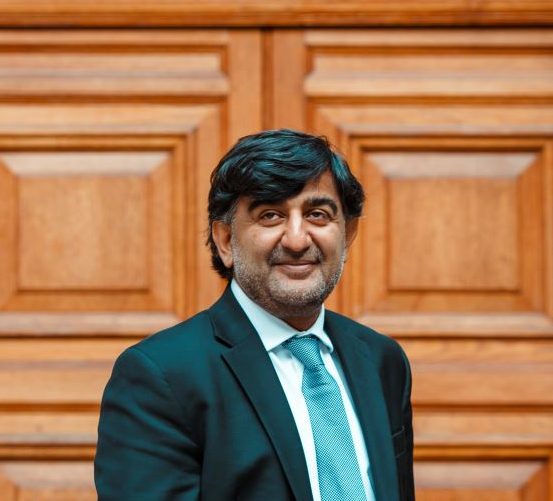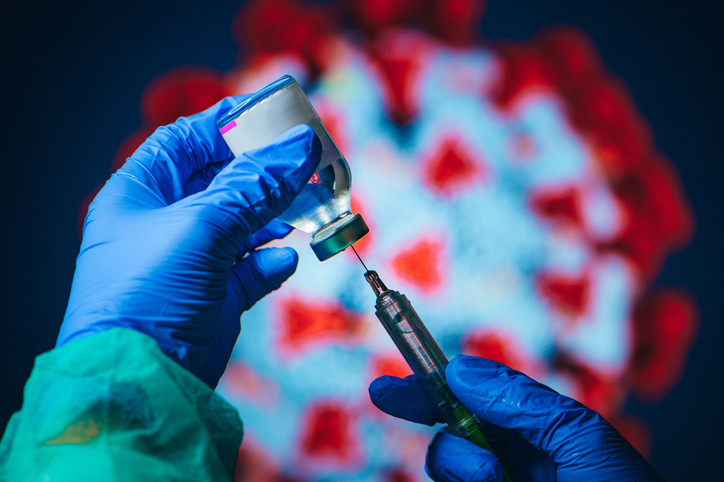Professor Aziz Sheikh discusses his research into COVID-19 vaccines
21 May 2021
Interview with Professor Aziz Sheikh OBE, Director of the Usher Institute at The University of Edinburgh and Director of BREATHE – the Health Data Research Hub for Respiratory Health.

View the latest work from EAVE II
Background
Professor Sheikh is at the forefront of the Data and Connectivity: COVID-19 Vaccines Pharmacovigilance project. Data and Connectivity is one of the country’s National Core Studies, which is led, funded and facilitated by HDR UK and its partners. Professor Sheikh’s research was vital in demonstrating the real-world effectiveness of the Oxford-AstraZeneca and Pfizer-BioNTech vaccines. Professor Sheikh is now researching other key vaccine issues – prioritising work in collaboration with UK vaccine regulators, directly informing the COVID-19 response.
Interview
What was your initial research?
“Using data from Scotland, we produced the world’s first countrywide estimates of the effectiveness of the Pfizer-BioNTech and Oxford-AstraZeneca vaccines in preventing hospitalisations. They are incredibly effective – reducing admissions by around 90%. We also looked at their performance in the elderly, because they were not really studied in the original clinical trials. We found they were at least equally as effective for older people. The bottom line is that the real world evidence mirrors the findings from trials.”
Has research been faster in the COVID-19 pandemic than in the past?
“We’ve been fortunate because there was pandemic preparedness after the H1N1 swine flu outbreak. But our research results into vaccine effectiveness in that context did not report until three years after the pandemic. This time it’s been three months. We have been carrying out research effectively in real time.”
Has access to large and high-quality datasets been important?
“Very much so. The HDR UK BREATHE Hub has allowed us access to a lot of vital data. And in Scotland we have been able to work very fast because we have the right systems and relationships in place. Everyone has recognised the need, we’ve been able to get everybody on the same page, so they’ve dropped other things to push this forward.”
Are you making your data more widely available?
“The HDR UK BREATHE Hub has been contributing datasets to the HDR Gateway. We want these data to be used by other groups, because there are no shortage of research questions to be answered and the quicker we can help get the UK out of social restrictions, the better.”
Are you looking at safety issues?
“We had a request from one of the chief scientific advisors to research safety considerations – triggered by the concerns around the Oxford-AstraZeneca vaccine. So we’ve done a piece of work looking at safety of both vaccines in relation to haematological and vascular adverse events. That has been completed in Scotland, the replication has been completed in Wales and England.”
What about vaccine failures and waning?
“We’ve done an analysis of first dose vaccine failures – people who sadly, two weeks after vaccination, go on to be hospitalised or die of Covid-19 when they should have a sufficient immune response. And we have looked at first dose waning. The manufacturers recommended second doses after three and four weeks. For understandable reasons policy makers decided to delay second vaccinations to 12 weeks to maximise coverage. The question is whether immunity wanes over that period.”
What impact is the Data and Connectivity: COVID-19 Vaccines Pharmacovigilance project having in the UK?
“It’s been incredibly reassuring. It’s given policymakers confidence that they’re on the right track. That confidence has then been communicated to the public. There has also been a direct communication to the public via the media following the preprint of our initial paper.”
What has been the international impact of your work?
“There’s been a lot of interest internationally. It has had global media coverage and we have liaised with other jurisdictions. The Canadians and French were particularly interested in how the Oxford-AstraZeneca vaccine was performing in the elderly. We made those data available and largely due to that they opened up the Oxford-AstraZeneca vaccine up to older age groups, as did other countries in Europe.”
Has this work enhanced the reputation of UK health data science?
“Absolutely. It’s showing is that we have phenomenal data assets in the UK, and we have got end-to-end capability. There are very few places in the world that this kind of work can be done. The US is really wishing that they could do this, but they don’t have these end-to-end databases on entire populations. And we have outstanding data wrangling, processing and analytical capacity.”
In future will research results be shared and published faster?
“Yes, but it’s context dependent. So in the context of a pandemic people want to make things happen as quickly as possible. Will that translate into routine practice? I don’t know. Normal governance rules have been relaxed temporarily to respond to the pandemic, but the scientific community needs to decide what happens in the future. With regard to academic papers, the journals are pretty slow but there seems to be a scientific consensus that preprints are appropriate in the current context. Overall, I don’t believe we will be able to maintain the incredible speed we’ve seen during Covid, but I think there will be some acceleration.”
Interim findings from first-dose mass COVID-19 vaccination roll-out and COVID-19 hospital admissions in Scotland: a national prospective cohortis are available in The Lancet.


